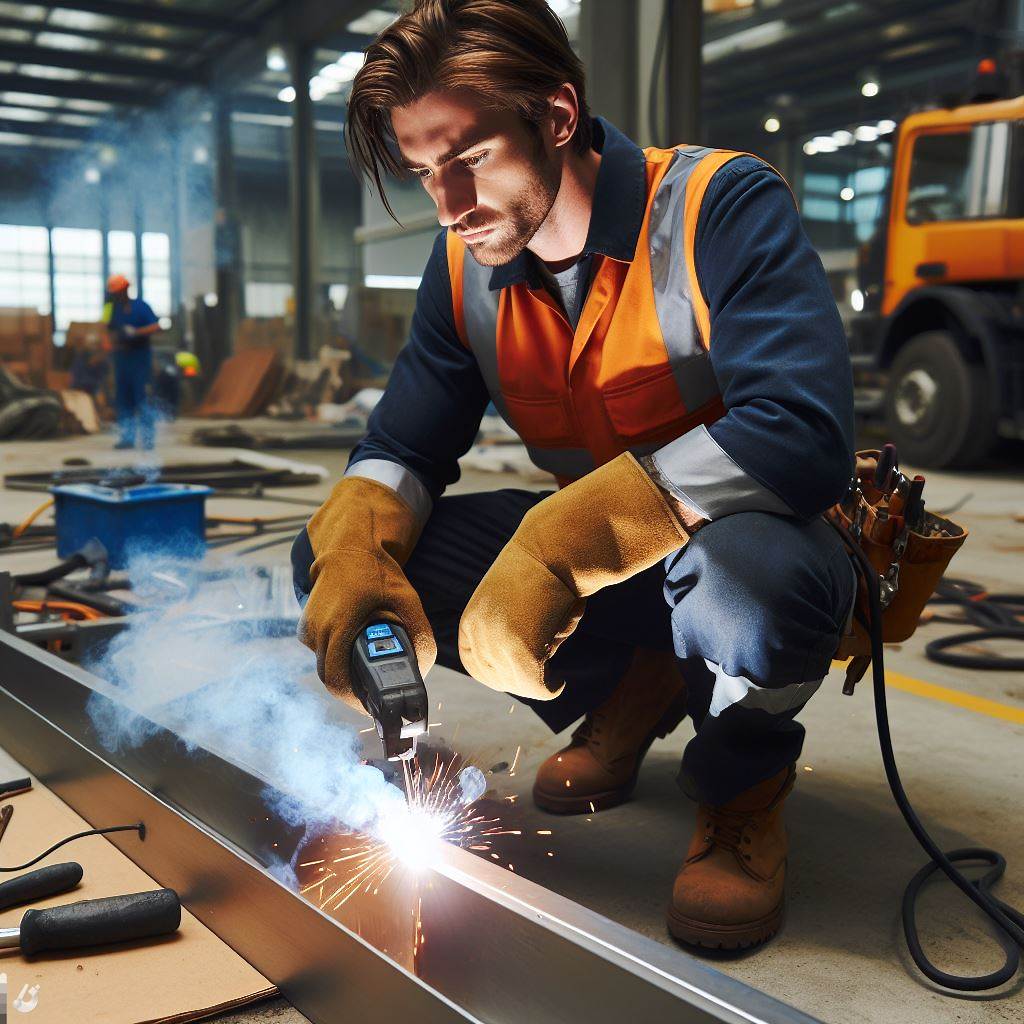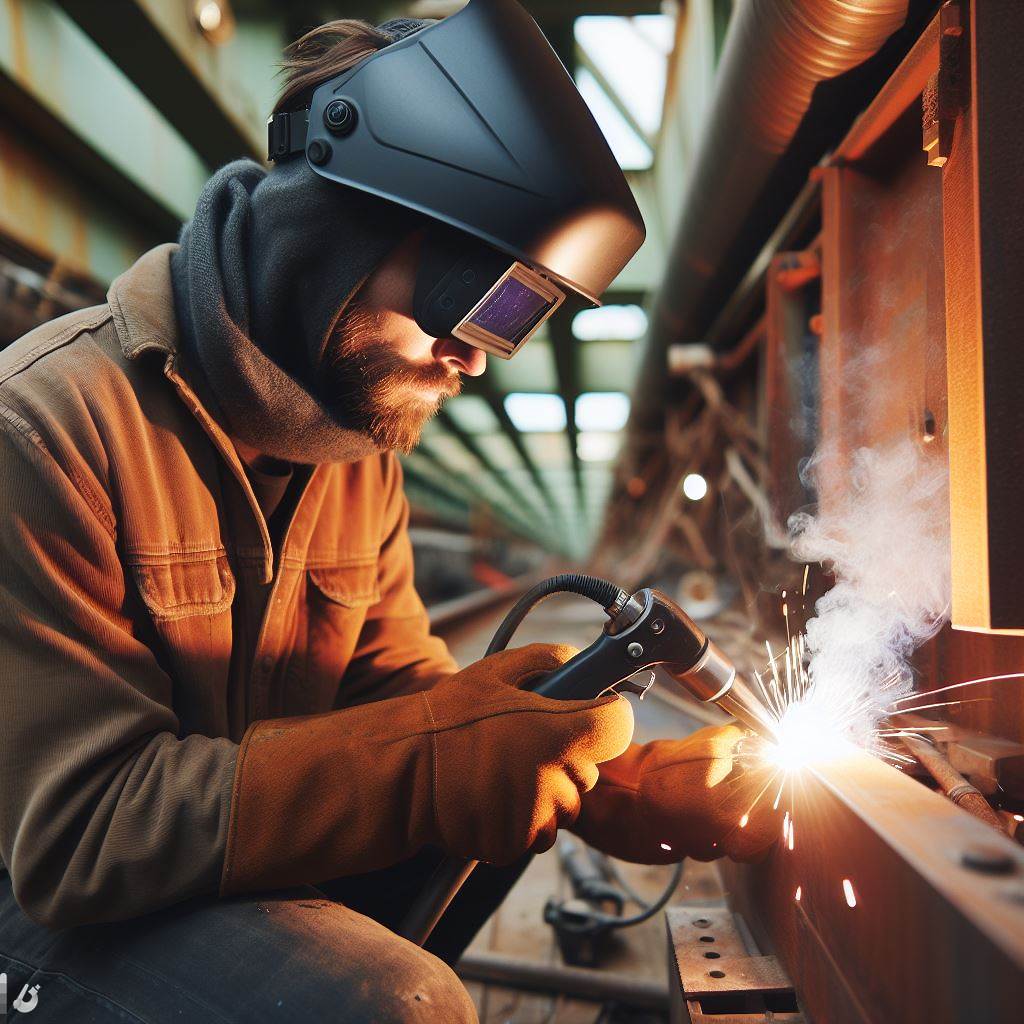Introduction
Unlocking the truth behind Australian Welders’ salaries is crucial for career planning. Understanding salary expectations empowers welders with informed decisions.
In this section, we’ll explore
- The Australian Welding Landscape: An overview of the welding industry’s current scenario.
- Salary Expectations: What welders anticipate and factors influencing their salary outlook.
- Realities of Welding Salaries: Exploring actual pay scales and regional variations.
- Skillset Impact: How welding skills and certifications impact earning potential.
- Industry Insights: Trends and factors shaping welding salaries in the Australian market.
Stay tuned to gain insights into the complex reality of Australian Welders’ salaries, helping you navigate your welding career effectively.
Overview of the Welding Profession in Australia
Significance of welding in various industries in Australia
- Welding plays a crucial role in the construction industry, ensuring structural integrity and safety.
- The automotive industry heavily relies on welding for the fabrication and repair of vehicles.
- Mining and resources sectors use welding extensively for equipment maintenance and repairs.
- Manufacturing sectors employ welders to fabricate metal components for various products.
- Welding is important in the aerospace sector for the construction and maintenance of aircraft.
Increasing demand for skilled welders in the country
- The demand for skilled welders in Australia has been steadily rising due to infrastructure and construction projects.
- With the mining industry booming, there is a high requirement for welders to maintain and repair mining equipment.
- The aging workforce has created a skills gap, leading to increased opportunities for welders in the job market.
- Industries recognize the importance of skilled welders in ensuring quality work and are actively seeking their services.
Different types of welding jobs available in the Australian market
- Structural Welding: Involves welding together metal components for buildings, bridges, and other infrastructure projects.
- Pipe Welding: Focusing on welding pipelines for oil, gas, and water transport, requiring precision and specialized techniques.
- Pressure Vessel Welding: Welding large containers that hold pressurized substances, adhering to strict safety standards.
- Sheet Metal Welding: Joining thin metal sheets for manufacturing industries like automotive, HVAC, and appliance production.
- Underwater Welding: Highly specialized field involving welding in underwater environments, often in offshore industries.
- TIG Welding: Known for its precision and cleanliness, commonly used in aerospace, automotive, and high-end fabrication.
- MIG Welding: A versatile method widely used in industries such as construction, manufacturing, and automotive.
- Flux Cored Arc Welding (FCAW): Suitable for outdoor welding conditions and used in industries like shipbuilding and construction.
- Robotic Welding: Increasingly adopted by industries for its speed, accuracy, and consistent quality.
- Aluminum Welding: Crucial in industries like aerospace, automotive, and marine, requiring specialized skills and techniques.
In short, welding is a vital profession in Australia, serving various industries in different capacities.
The demand for skilled welders is on the rise, with opportunities available in structural, pipe, pressure vessel, sheet metal, underwater, TIG, MIG, FCAW, robotic, and aluminum welding.
Welders play a significant role in maintaining the infrastructure, contributing to the country’s development and progress.
Expected salary range for Australian welders
– The average salary range for welders in Australia is between $50,000 and $80,000 per year
Factors that affect the salary expectations for welders
- Location: Welders in urban areas or areas with a high demand for skilled labor may earn higher salaries.
- Industry: Different industries, such as construction, manufacturing, or mining, may offer varying salary levels.
- Company size: Larger companies may have more resources to offer higher salaries compared to smaller companies.
- Job demand: Welders specialized in areas with high demand, such as pipe welding or structural welding, may earn more.
Experience, skills, and qualifications
– Experience, skills, and qualifications that influence the salary level
- Experience: Welders with more years of experience generally earn higher salaries.
- Skills: Welders with additional specialized skills, such as TIG welding or underwater welding, may command higher salaries.
- Qualifications: Welders with certifications, such as a Certificate III in Engineering – Fabrication Trade, may earn higher salaries.
It is important for welders to continuously update their skills and pursue further certifications to enhance their earning potential.
Strategies for Elevating Welding Income: Reputation, Networks, and Industry Trends
Moreover, welders who can demonstrate a track record of successful projects and satisfied clients may negotiate higher salaries based on their reputation and quality of work.
Welders can also consider joining professional organizations or unions to access better salary negotiation resources and collective bargaining power.
Developing a strong network within the welding industry can also lead to opportunities for higher paying jobs and contracts.
Furthermore, keeping an eye on industry trends and advancements can help welders identify emerging areas of specialization that may offer higher salaries.
In fact, the expected salary range for Australian welders is influenced by factors such as location, industry, company size, job demand, experience, skills, and qualifications.
Welders who invest in advancing their skills and qualifications, specialize in high-demand areas, build a strong reputation, and leverage industry connections can increase their earning potential in this field.
Read: How to Become a Plumber in Australia
Reality check: Actual salaries of Australian welders
When it comes to welding as a profession, it’s crucial to have a clear understanding of what to expect in terms of salaries.
In this section, we will delve into the reality of Australian welders’ salaries and provide insights into the various factors that impact their income.
Real-life examples of salary ranges
To give you a concrete idea of the earning potential of Australian welders, let’s take a look at some figures obtained from surveys and official sources. The salary range for entry-level welders can typically start from $40,000 to $50,000 per year.
Your Personalized Career Strategy
Unlock your potential with tailored career consulting. Get clear, actionable steps designed for your success. Start now!
Get StartedVariations based on location, industry, and specialization
It’s important to note that wages for Australian welders can vary significantly depending on their location, the industry they work in, and their specialization.
Welders employed in remote or regional areas often earn higher salaries due to the lack of skilled workers in those areas. On the other hand, welders in metropolitan areas may face more competition, which can impact their earning potential.
When it comes to industries, welders working in sectors such as mining, oil and gas, construction, and manufacturing tend to earn higher salaries compared to those in other industries.
This is primarily because these industries require highly skilled welders due to the nature of the work involved.
Additionally, welders with specialized skills or certifications, such as underwater welding or working with exotic materials, can command higher salaries due to the scarcity of professionals with such expertise.
Potential for overtime, bonuses, and other benefits
Apart from the base salary, there are other factors that can impact the overall income of Australian welders. Overtime is one such factor.
Depending on the project and the demand for welding services, welders may have the opportunity to work additional hours, which can significantly increase their earnings.
Furthermore, many companies offer bonuses based on factors like productivity, performance, or completing projects within specified timelines. These bonuses can add a considerable amount to a welder’s overall income.
In terms of benefits, welders often receive additional perks like health insurance, retirement plans, and paid holidays. These benefits not only contribute to their overall income but also provide financial security and stability.
It’s worth mentioning that welders who are a part of a trade union may have better negotiating power when it comes to salaries and benefits.
Unionized welders often benefit from collective bargaining agreements that ensure fair compensation and working conditions.
Therefore, the reality of Australian welders’ salaries is influenced by several factors including location, industry, specialization, overtime, bonuses, and benefits.
Understanding these factors is crucial for welders to have realistic expectations about their potential income.
By considering all these aspects, aspiring welders can make informed decisions about their career path and negotiate a fair compensation package that reflects their skills and expertise.
Read: Top Plumbing Trends in Australian Engineering

Factors affecting welders’ salaries in Australia
Influence of Industry Demand
- Welders in industries with high demand, such as construction and mining, can expect higher salaries.
- Industries experiencing economic downturns may lead to reduced demand and subsequently lower wages.
- Welders with specialized skills in industries with limited talent pools often command higher salaries.
Role of Certification and Qualifications
- Holding certifications, such as the Australian Welding Certification, can positively impact a welder’s salary.
- Higher-level qualifications, such as advanced welding degrees or technical diplomas, often result in higher wages.
- Continuous updating of skills and staying up-to-date with industry standards can lead to wage increases.
Impact of Experience, Job Performance, and Reputation
- Welders with more experience generally have higher earning potential due to their expertise and knowledge.
- Demonstrating excellent job performance, meeting deadlines, and producing high-quality work can lead to salary advancements.
- Building a reputation for being reliable, efficient, and skilled can result in better pay opportunities.
Several factors influence the salaries of Australian welders. Industry demand plays a crucial role in determining wages, with higher demand industries offering better pay.
Certification and qualifications contribute significantly to earning potential, with specialized certifications and higher-level qualifications leading to higher salaries.
Experience, job performance, and reputation also impact wages, with more experienced welders and those with outstanding performance and a solid reputation typically earning more.
It is essential for welders to continuously update their skills, stay up-to-date with industry standards, and strive for excellence in their work to maximize their earning potential.
Read: The Future of Plumbing Tech in Australia
Tips for Negotiating a Better Salary as a Welder
When it comes to securing a higher salary as a welder, it’s important to approach negotiations strategically.
By following these tips, you can advocate for yourself effectively and increase your chances of getting the compensation you deserve.
Provide recommendations on advocating for a higher salary during job interviews or performance reviews.
During an interview or performance review, it’s crucial to demonstrate your value and worth as a welder. Here are some recommendations to help you negotiate a higher salary:
- Highlight your achievements and successes in previous welding positions.
- Emphasize your ability to meet deadlines and produce high-quality work.
- Showcase any additional skills or certifications that make you stand out.
- Quantify your contributions by discussing any cost-saving measures or efficiency improvements you implemented.
- Research the average salary range for welders in your area and use that information as leverage.
- Express your enthusiasm for the role and your commitment to continuous learning and growth.
The importance of highlighting skills, certifications, and experience to justify a higher wage
When negotiating a higher salary, it’s crucial to effectively communicate the value you bring to the table. Consider incorporating the following strategies to support your case:
Stand Out with a Resume That Gets Results
Your career is worth more than a generic template. Let us craft a resume and cover letter that showcase your unique strengths and help you secure that dream job.
Get Hired- Highlight your specialized welding skills, such as TIG, MIG, or underwater welding.
- Showcase any relevant certifications or qualifications you have obtained.
- Demonstrate how your experience sets you apart from other candidates.
- Discuss any additional responsibilities or leadership roles you have taken on.
- Provide examples of successful projects you have completed in the past.
- Explain how your skills and experience can positively impact the company’s bottom line.
Share strategies for researching industry standards to set realistic salary expectations.
It’s important to have a realistic understanding of the salary expectations for welders in your industry. Follow these strategies to ensure you are well-informed:
- Utilize online resources, such as industry websites and salary surveys, to gather information.
- Network with other welders or professionals in the field to gain insights into salary ranges.
- Consult with recruitment agencies or professionals who specialize in the welding industry.
- Consider the location, demand, and cost of living factors that may influence salary levels.
- Take into account your level of experience, education, and any specialized skills you possess.
- Compare and analyze multiple sources of salary data to get a comprehensive view of industry standards.
By following these tips, you can confidently negotiate a better salary as a welder.
Remember to approach negotiations professionally and be prepared to justify your worth through highlighting your skills, certifications, and experience.
With thorough research and effective communication, you can increase your chances of achieving the salary you desire.
Read: A Day in the Life of an Aussie Plumber
Uncover the Details: Mech Eng Challenges in Australian Climate
Conclusion
In closing, understanding the salary expectations versus reality for Australian welders is crucial.
We have discussed the average salary ranges, factors that can influence wages, and the importance of negotiating fair compensation.
By being informed, welders can make better career decisions and ensure they are being paid what they deserve.
It is evident that the welding profession offers a wide range of salary possibilities, with higher levels of experience and specialized skills leading to better pay.
However, it is important to manage expectations realistically. The reality is that not all welders will earn the top salaries, and some may need to start at the lower end of the scale.
To ensure fair compensation, it is essential for welders to research and understand industry standards and salary ranges. Armed with this knowledge, they can confidently negotiate their salaries and avoid being underpaid.
Welders should actively seek out opportunities to increase their skills and knowledge to enhance their earning potential.
We encourage readers to use the information provided in this blog post as a starting point for their own salary negotiations.
By knowing the average salary ranges and understanding the factors that influence wages, welders will be better equipped to advocate for fair compensation.
Remember, your skills and expertise are valuable, and it is important to be proactive in ensuring you are adequately compensated for your work.
Take charge of your career and make informed decisions when it comes to your salary expectations.




